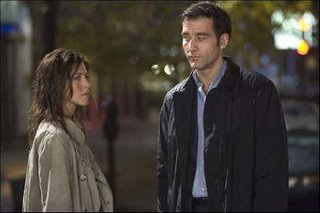
SULLIVAN'S TRAVELS (1941)
A film review by Dan Navarro
Copyright Dan Navarro 2007
Writer-director Preston Sturges' Sullivan's Travels (1941), a wicked satire of Hollywood, is a masterpiece, one of the best films ever made.
The first time I saw this pinnacle of Sturges' estimable career was at an "aud call" when I was in grammar school. The teachers herded us kids into the auditorium to watch a 16mm print of it and, they hoped, get us out of their hair for an hour and a half. I was only about 6 years old, but I believe Sullivan's Travels is the first film that ever made me cry tears of joy. It's been more than half a century, but my eyes still well up when I watch it, a sign that either the film is effective or I'm an easy mark. I prefer to believe it's the former.
The plot tells of John L. "Sully" Sullivan, a Hollywood director who is a big success at turning out comedies, but then gets it into his head that he should direct a "serious" film with social significance, all about tragedy, hopelessness, and suffering. To prepare himself for this bleak scenario, he decides to go on the road dressed as a bum, with only ten cents in his pocket, to learn what it's like to be poor and hungry. Be careful what you wish for. Before Sullivan's travels come to an end, he will have visited the darkest corner of the deepest pit of the human condition.
This being a Preston Sturges picture, of course there's a happy ending. But he puts the hero through hell before that happens. There's also a romance of sorts, pairing Sullivan (Joel McRea) with a young woman we know only as The Girl (Veronica Lake). I say "of sorts" because there is no love scene per se, no kissing, not even any fond hugging. The closest they ever get physically is one evening when the two ersatz hobos (The Girl has joined him in his masquerade) stop to admire the moon... and put their arms around each other, lightly. Less is more. I think the love between them seems stronger than if they were pawing each other every few minutes.
Preston Sturges began his Hollywood career as a screenwriter (Never Say Die [1939], Remember the Night [1940]), but soon prevailed on the studio brass to put him on as a director, because he was frustrated at the way directors were reshaping his words. His first film as both writer and director, The Great McGinty (1940), was a hit, and won him an Oscar for Best Original Screenplay. Sturges was on his way.
There's an early scene in Sullivan's Travels that deftly shows off Sturges' skill with wordplay. McRea, Robert Warwick, and Porter Hall are having a vigorous debate over the wisdom of embarking on Sullivan's new, change-of-pace film. The rapid-fire dialogue is intoxicating to listen to, because it seems the actors never take a breath. As each line ends, a new one begins, as if we are watching a relay race with words instead of batons. That's not all: The entire scene, from beginning to end, is shot in one continuous take, with no cuts. The camera moves as necessary, to follow the actors, but essentially it is all a single shot. And Sturges manages to bring the scene in at four minutes flat. I have no idea how he did it, or how many retakes were needed to achieve this precision. But the effect is mesmerizing.
Sturges gives us many great scenes in Sullivan's Travels, but there is one that really put a lump in my throat. Sully has been imprisoned in a Deep South chain gang presided over by a ruthless warden (the great Alan Bridge). The warden won't brook Sully's independent attitude and resolves to crush his spirit by locking him in "the sweat box," a sadistic, one-man windowless cell where the hapless prisoner is forced to stand for hours, alone.
The prison trusty, played by Sturges regular Jimmy Conlin, visits the sweat box periodically and gives water to the dehydrated prisoner, and also gives him words of encouragement. Finally, at night, the trusty is allowed to open the sweat box and release Sullivan from this torture device. He unlocks the door, and the exhausted Sullivan collapses into his arms. The camera remains still for several seconds while the trusty cradles him gently. I don't know if Sturges intended this, but the shot reminded me of a Renaissance painting of St. John holding the body of Christ after the Crucifixion.
Sullivan's personal epiphany comes when he joins the other prisoners as guests at a local black church, where they are treated to an evening of Mickey Mouse cartoons. The prisoners, the warden, even the preacher, laugh uproariously at the antics of Mickey and his dog Pluto. Finally, Sullivan starts to laugh, too. And that's when this great comedy director realizes the truth: the best gift he can offer his audiences is not dour drama, but comedy -- pictures that enrich the human condition by offering a touch of happiness in a world too filled with tragedy.
McRea's final line in the movie is one of the greatest closers ever. After Sullivan's eventual escape and reunion with his Hollywood friends, he announces that he won't be making that "socially significant" picture after all. He'll stick to making comedies. Why? "There's a lot to be said for making people laugh. Do you know that's all some people have? It's not a lot, in this cockeyed caravan, but it's better than nothing. Boy!"

